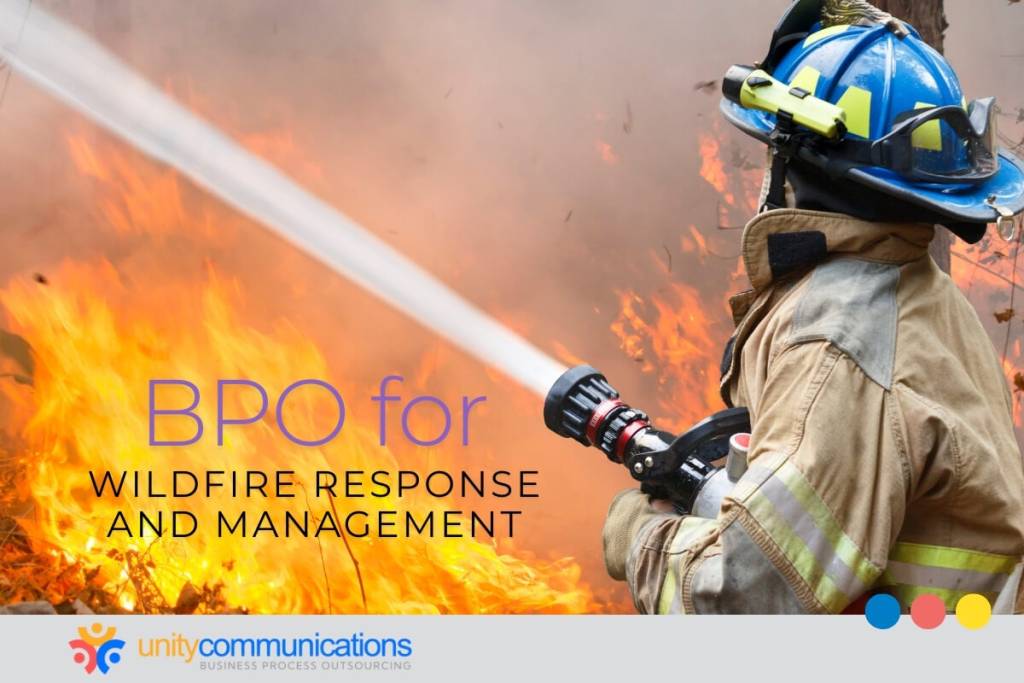Table of Contents
Reports show that 82% of organizations standardized protocols and tasks through business process outsourcing (BPO). Such efficiencies can significantly benefit wildfire risk mitigation efforts, where effective response and management are crucial.
Outsourcing also provides organizations with specialized expertise, technologies, and resources. These additional capabilities are invaluable for streamlining and enhancing data management and analysis, communication, and monitoring.
This article is for you if you want to learn more about leveraging BPO services for wildfire response and management. It explores the different ways outsourcing can support organizations in improving preparedness, response, and recovery processes.
Understanding the nature of outsourcing

To better understand how outsourcing can help with wildfire response and management, it’s best to first answer the question: What is BPO?
BPO is the practice of delegating non-core tasks to an external team. It lets businesses access a global talent pool of experts and advanced technologies, providing much-needed scalability and flexibility.
These advantages make the practice increasingly popular across various industries. According to Statista, the global BPO market could grow to $6.84 billion by 2029.
BPO in the context of wildfire response and management typically involves outsourcing the following tasks:
- Data management (e.g., collecting, storing, analyzing, and visualizing large datasets)
- Communication (e.g., disseminating critical information effectively, including emergency contact information)
- Logistics (e.g., managing the supply chain for wildfire response equipment, supplies, and personnel)
- Emergency response planning (e.g., developing and implementing contingency plans, evacuation processes, and public information strategies)
- Technology support (e.g., providing information technology support to ensure communication systems and data management tools can function properly during a wildfire emergency)
Key benefits of leveraging BPO for wildfire response and management

Due to their established protocols and standards, BPO providers offer a reliable and efficient solution for wildfire response and management. Deloitte’s 2023 global shared services and outsourcing survey proves this. In the study, 82% of businesses report standardizing processes and enhancing efficiencies after partnering with BPO teams.
Additionally, the increasing use of artificial intelligence (AI) in the BPO industry further enhances process accuracy and timeliness. This emerging technology is helpful in various tasks relevant to wildfire prevention and suppression efforts.
Learn more about the advantages of leveraging BPO services for wildfire response and management:
1. Enhanced communication channels
During wildfire emergencies, timely and accurate communication is crucial for coordinating response efforts, informing the public, and ensuring the safety of affected individuals. BPO providers can be vital in maintaining effective communication.
BPO teams collaborate with agencies to tailor the following channels to wildfire response and management efforts.
- Call centers and hotlines to handle incoming calls from the public, responders, and government agencies.
- Social media platforms, such as Facebook, Twitter, and Instagram, to disseminate information quickly while reaching a broad audience.
- Automatic text message alerts to provide updates on fire activity, evacuation orders, and other crucial information.
- Website portals to provide comprehensive information about wildfire emergencies, including real-time updates, safety guidelines, and resources.
2. Improved data management and analysis
Outsourcing providers can implement systems to collect real-time data from various sources, specifically those crucial for preparing for a wildfire. That includes:
- Weather stations (e.g., data on temperature, humidity, wind speed, and precipitation)
- Remote sensing technologies (e.g., satellite imagery, drones, and aerial surveillance to track fire behavior and spread)
- Ground-based sensors (e.g., data on fuel moisture, soil conditions, and air quality)
- Incident reports (e.g., information from firefighters, local emergency service providers, law enforcement, and the public)
BPO teams also utilize artificial intelligence (AI) and advanced analytics tools to examine data and extract meaningful insights for wildfire response and management. These tools include:
- Risk assessment for evaluating the potential impacts of wildfires on communities, infrastructure, business continuity plans, and ecosystems.
- Visualization tools for creating maps, charts, and other visualizations to communicate complex data effectively and streamline emergency management.
- Predictive modeling for forecasting fire behavior, identifying potential hotspots, and estimating the severity of wildfires using historical data.
3. Streamlined resource allocation
Timely and efficient resource allocation protects lives and property and minimizes environmental damage during a wildfire. BPO providers can play a significant role in streamlining resource allocation for wildfire response and management efforts.
They perform the following tasks to deploy resources efficiently to areas that need them the most:
- Inventory management (e.g., real-time tracking, demand forecasting, and inventory optimization)
- Transportation and logistics (e.g., route optimization, fleet management, and distribution planning)
- Personnel management (e.g., scheduling and shift planning, communication, and coordination)
4. Coordinated multi-agency efforts
Seamless and real-time coordination is crucial in the event of a wildfire. Response and management efforts typically involve fire departments, forestry agencies, emergency management organizations, and law enforcement.
BPO providers can facilitate collaboration between organizations involved in wildfire response and management efforts. Besides optimizing resource allocation, third-party teams can help by:
- Implementing collaborative platforms (e.g., using incident management systems, geographic information systems, and messaging and communication tools)
- Streamlining information sharing (e.g., standardizing data formats, implementing data-sharing protocols, and providing real-time updates)
5. Optimized emergency response plans
Anticipating scenarios and developing strategies to address them enables agencies to improve their readiness and reduce the impacts of wildfires. BPO teams can offer valuable expertise in developing and refining emergency response plans.
Here are some of the ways BPO providers can contribute to wildfire emergency response planning and management efforts:
- Evaluating the likelihood and severity of different wildfire risks and scenarios.
- Defining the roles and responsibilities of different agencies and personnel.
- Establishing procedures for communicating with the public, local emergency responders, and government officials.
- Identifying and securing necessary resources, such as personnel, equipment, and supplies.
- Developing strategies for communicating with the public during a wildfire emergency.
- Testing emergency response plans through tabletop exercises, simulations, and drills to identify weaknesses and areas for improvement.
- Developing contingency plans, including alternative response strategies, resource contingencies, and crisis communication plans to address unexpected challenges.
6. Utilizing predictive analytics
Predictive analytics can help forecast wildfire behavior, identify potential hotspots, and assess the severity of threats. BPO providers specializing in predictive analytics can help develop and implement models for wildfire response and management efforts.
The primary applications of predictive analytics include the following:
- Fire behavior forecasting: The information gathered here can help guide resource allocation and response strategies.
- Hotspot identification: The data allows teams to implement proactive measures, such as fuel reduction treatments or increased surveillance, in high-risk areas.
- Severity assessment: This information can help prioritize response efforts and allocate resources accordingly.
The bottom line

BPO services significantly enhance wildfire response and management efforts. They provide valuable expertise, technology, and resources to improve communication, data management, resource allocation, coordination, and preparedness.
By partnering with a BPO provider, organizations can mitigate risks and protect communities, infrastructure, and ecosystems.
Let’s connect if you want to learn more about BPO services for wildfire response and management!




